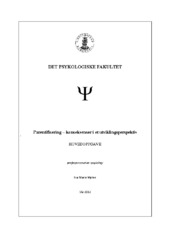| dc.contributor.author | Myhre, Ina Marie | |
| dc.date.accessioned | 2013-02-28T08:01:36Z | |
| dc.date.available | 2013-02-28T08:01:36Z | |
| dc.date.issued | 2012-04-14 | eng |
| dc.date.submitted | 2012-04-14 | eng |
| dc.identifier.uri | https://hdl.handle.net/1956/6363 | |
| dc.description.abstract | The purpose of this paper is to elucidate parentification as a phenomenon. Parentification can cause a number of personality-related, emotional and social consequences for the children who experience it. Alcohol abuse among parents with impaired parental functioning is a risk factor for parentification of children. The phenomenon can be partly explained by attachment theory. When the parents are unavailable to the child, the child learns that it must give its care to them in order to experience intimacy. These expectations follows the child in future relationships, also as adults. Research shows that people who experience childhood parentification are at greater risk for psychopathology in adulthood. Treatment focuses on increasing the support between the adult members of the family. The establishment of appropriate generation boundaries and parental training are also a part of treatment when considered necassary. Deparentifiaction is a proposed framework in this context, where the therapist offers the patient a reparative relationship. A study of parentified adolescents with alcohol abusing parents showed the needs the young people had. This involved an adult person to confide in, contact with others in the same situation, respite from the domestic situation, appreciation from the educationsystem and assistance to the family. This knowledge provides information on the main measures and treatment for this group of children and adolescents. | en_US |
| dc.description.abstract | Formålet med denne oppgaven er å belyse fenomenet parentifisering. Parentifisering kan medføre en rekke personlighetsmessige, følelsesmessige og sosiale konsekvenser for de barna som opplever det. Alkoholmisbruk hos foreldre med svekket foreldrefungering er en risikofaktor for parentifisering av barna. Fenomenet forklares blant annet gjennom tilknytningsteori. Når foreldrene er utilgjengelige for barnet, lærer barnet at det må gi av seg selv til den voksne for å oppleve nærhet. Forventninger som dette følger barnet i fremtidige relasjoner, også i voksen alder. Forskning viser at mennesker som opplever parentifisering i barndommen har en større risiko for å oppleve psykopatologi som voksne. Viktige fokus i behandling kan være å øke støtten mellom voksne medlemmer i familien, etablere passende generasjonsgrenser og tilby foreldretrening der det anses nødvendig. Deparentifisering er et foreslått rammeverk i denne sammenhengen, der terapeuten bidrar med et reparativt forhold til den parentifiserte pasienten. En studie av parentifiserte ungdommer med alkoholmisbrukende foreldre viste hvilke behov de parentifiserte ungdommene hadde. Dette innebar en voksenperson å betro seg til, kontakt med andre i samme situasjon, pusterom fra hjemmesituasjonen, forståelse fra utdanningssystemet og hjelp til familien. Denne kunnskapen gir informasjon om viktige tiltak og behandling for denne gruppen barn og unge. | en_US |
| dc.format.extent | 463574 bytes | eng |
| dc.format.mimetype | application/pdf | eng |
| dc.language.iso | nob | eng |
| dc.publisher | The University of Bergen | eng |
| dc.title | Parentifisering - konsekvenser i et utviklingsperspektiv | eng |
| dc.type | Master thesis | |
| dc.rights.holder | Copyright the author. All rights reserved | |
| dc.description.localcode | PSYK300 | |
| dc.description.localcode | PRPSYK | |
| dc.subject.nus | 736102 | eng |
| fs.subjectcode | PSYK300 | |
